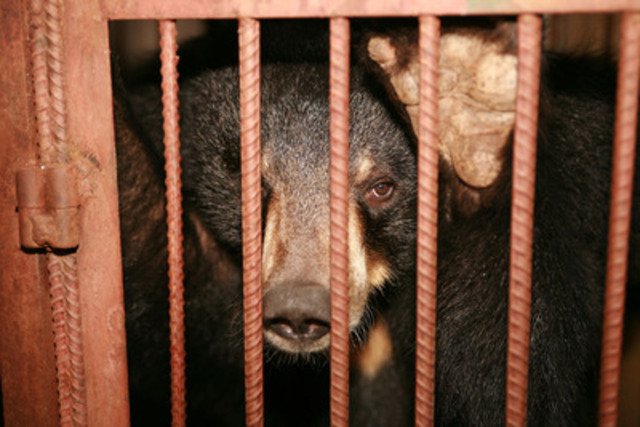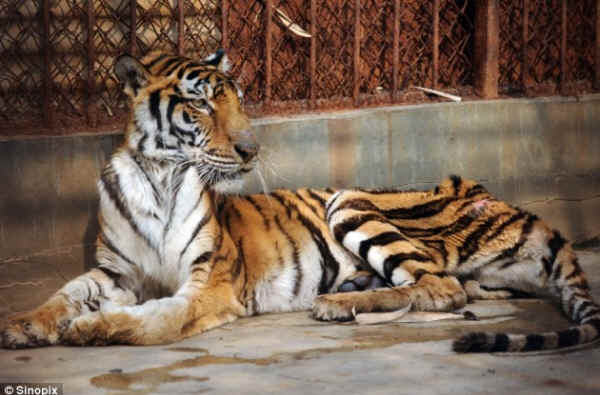What is it?
Traditional medicine seeks to help the body's balance by using natural substances, such as herbs. But the strong Asian demand for traditional medicine has promoted a lot of destruction to wildlife because many "cures" involve animal parts. The trade of traditional medicine is a billion-dollar industry, and growing. Its products are used by up to half of the world's population, so it is not at all limited to Asian countries.
What other practices does it influence?
 |
| This is a very nice picture compared to what I could've put here, it's seriously heart-breaking stuff. |
A farm is a happy place with sunshine, horses, fresh-baked pies, and rolling green hills, right? Not this type of farm. In parts of Asia, such as China and Vietnam, bears are kept in tiny cages, in horrid conditions, and "milked" for their bile. Bile is a digestive fluid stored in the gallbladder, and not meant to exit the body, like milk is. So, to extract it, bears are punctured with steel rod catheters in their abdomen, which is not only extremely painful, it often leads to infection and tumors. I invite you to Google for pictures, but beware it is very graphic. It is estimated that 10,000 bears are subject to this fate in China alone. Bear bile is used in traditional medicine as a cure for fever and convulsions, and is also in household products, but this torture is completely unnecessary- there are many inexpensive synthetic and herbal alternatives. Read more here, and if you can, please donate to help stop this cruelty.
 |
| No this is not the Pink Panther with striped paint, this is really happening right now guys... |
Researching for this blog, I was appalled to find this...Tiger farms. Wild tigers are poached for their body parts but this may just be worse than that. In Asia, tigers are bred. Not for biodiversity, not for the sake of the species, and not to be released into the wild. They are bred for their meat, their fur, their bones, and for entertainment. Kept in small enclosures, malnourished, abused, and butchered at "slaughter parties". Tiger parts in traditional medicine, particularly tiger bone wine, is only a part of the monetary influence for tiger farms, it is also funded by demand of lavish products by the wealthy, and much much more. I'm going conclude this paragraph only because I can't emotionally handle this right now, and I will have to come back to this subject in the future to elaborate. This is yet another completely unnecessary practice only successful because of people's greed and utter disregard for the value of life. Here's a news report about it.
 |
| A little comparison here- rhino horn is worth more than twice the value of gold. |
Rhino and elephant ivory has always been valued. Powdered rhino horn is seen as a cure for gout and fever, and its demand has increased since a Vietnamese official claimed it cured his cancer (an official who I'd personally love to pulverize into powder- see if he likes it!). I've already talked a lot about the consequences of the ivory trade, but I'm just mentioning it here because traditional medicine is one of the reasons why poaching rhinos and elephants is so profitable.
What can we do to stop it?
Consumer awareness. If people knew they were buying a product that is causing the extinctions of tigers, I don't think they'd be as likely to buy it. Just like people purchasing shark fin soup are rarely aware of its damage. So spread the word, tell your friends how incredibly messed up this is. And of course, please don't buy any traditional medicine products with animal components.
Keep in mind that not all traditional medicine involves animal parts, and so I am not condemning all forms of traditional medicine. In fact, less than 10% of Chinese medicine involves animal parts. So can we just get rid of that 10%? Also, bears and tigers are not the only animals effected, other victims include many species ranging from snow leopards to seahorses.
This "medicine" is more like a disease killing our precious wildlife, and such pointless destruction needs to stop.
Read more about it here.
Thank you for reading everyone!

No comments:
Post a Comment